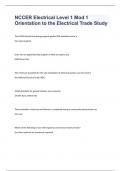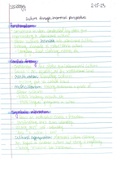Summary
Summary A* Soul, mind and body notes
- Institution
- OCR
I am predicted A* and have got A* in all of my mocks and have completed my A level exams in 2022. These notes are 5-10 pages and include everything on the specification: * the philosophical language of soul, mind and body in the thinking of Plato and Aristotle * metaphysics of consciousness,...
[Show more]






